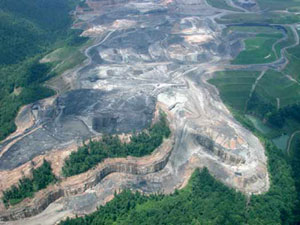In a major step forward in stopping the blasting of mountaintops to get to coal, a federal court unanimously upheld the Environmental Protection Agency’s (EPA) authority to veto these projects under the Clean Water Act.
In 2011, EPA, for the first time, revoked a permit for mountaintop removal. It was for Spruce Mine, the biggest, most destructive project proposed to date.
The permit would have allowed Arch Coal to destroy 3000 acres of mountaintops and allow the toxic waste to flow into six miles of pristine mountain streams.
The Army Corps of Engineers approved the permit in 2007 and the EPA revoked it because the mine would cause unacceptable damage to rivers, wildlife and communities in West Virginia.
Yesterday, the federal Court of Appeals in Washington DC upheld the EPA’s right to veto that permit, reversing the lower court’s contrary ruling – a major blow to the coal industry.
Appalachian citizen groups have been fighting the coal company and the state of West Virginia against the Spruce Mine for over a decade.
"The U.S. Army Corps of Engineers has literally overseen the destruction of Central Appalachia, and EPA oversight is needed to stop it," says Joe Lovett of Appalachian Mountain Advocates.

"Now, we just need EPA to take action to protect more communities and mountain streams before they are gone for good," says Emma Cheuse, an Earthjustice attorney.
Not so fast say West Virginia representatives who plan to continue the court process as well as introduce legislation to block EPA’s rights. The "Clean Water Cooperative Federalism Act" would "prevent the EPA from using the guise of clean water as a means to disrupt coal mining," says Rep. Nick Rahall (D-W.VA).
The coal industry, some utilities and their congressional allies contend the EPA is trying to kill the industry.
"A cloud of uncertainty now hangs over any project and companies will no longer have the assurance required to encourage investments, grow our economy and create U.S. jobs," Hal Quinn, CEO of the National Mining Association told the LA Times.
Mountaintop-removal coal mining has destroyed over 500 mountains, a million acres of forest and 2,000 miles of streams in Appalachia.
Pollution from mountaintop-removal mining has been found to cause deformities and reproductive failure in downstream wildlife and has been associated with cancer clusters in nearby communities.
Earthjustice, along with Appalachian Mountain Advocates, is representing West Virginia Highlands Conservancy, Ohio Valley Environmental Coalition, Coal River Mountain Watch, Sierra Club, and Natural Resources Defense Council as amici curiae ("friends of the court") in support of EPA’s veto in this case.
Why do coal companies like mountaintop removal so much?
It’s cheaper than underground mining and requires fewer people to do the work. During the Bush Administration, the already loose regulations were loosened even more, allowing coal companies to simply dump the debris right into the rivers below.
"50 years ago there were 151,000 coal miners in West Virginia and today there are 15,000 and yet the coal coming out each year has soared in that period of time," Robert Kennedy Jr says.
While mountaintop removal mining supplies less than 5-7% of national coal production, millions of pounds of explosives are detonated every day in West Virginia, Kentucky, southwest Virginia and eastern Tennessee.
Patriot Coal agreed to stop the practice last year.
